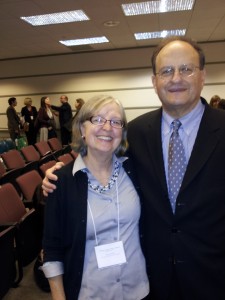I joined other legal aid directors as well as pro bono attorneys and courtroom judges Wednesday at the first annual conference hosted by the Illinois Supreme Court Commission on Access to Justice.
Together we grappled with how to better serve the state’s poorest residents.
After a warm welcome from Illinois Chief Justice Thomas L. Kilbride, himself a former legal service attorney, we listened to a thoughtful exposition of how justice for the poor is a true mandate in the state and the U.S. constitutions.
The keynote speaker, Mississippi’s presiding Supreme Court Justice, Jess H. Dickinson, eloquently urged us to fulfill this mandate. Quoting Justice Learned Hand, he pressed the Illinois court not to settle for “ration(ing) justice” but to expand efforts to secure pro bono attorney services, expand state- and federally-supported legal services to the poor, and create mechanisms for the court system itself to respond to the needs of our poorest people.
Through a series of excellent presentations, the group considered the growing low-income population in Illinois – now at 2.2 million – and the need to better address legal help for unrepresented litigants. These litigants include households that are middle-income, disabled, or have language and literacy barriers.

The states of California, Minnesota and Illinois have instituted some measures to create greater access for litigants who lack an attorney. These measures include standardizing legal forms for use across a state, professionally staffed legal self-help desks, and creating more interactive web tools such as Illinois Legal Aid Online.
The commission is chaired by Jeffrey D. Colman, a partner at Jenner & Block LLP, and a former president of the Chicago Bar Foundation. Presenters at the conference included Dina Merrell, associate director of the Chicago Bar Foundation, and Mark Marquardt, deputy director of the Lawyers Trust Fund of Illinois.
As the commission’s work moves forward, additional topics affecting access to justice will be considered and studied.
– Laurene Heybach, Director, The Law Project
